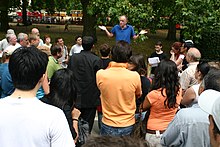speech


A speech is usually pre- considered , oral communication, which one speaker to several people (audience at public speaking audience ) is directed. In contrast to the reciter , the speaker presents his own thoughts. Manuscripts and printed versions of speeches are also referred to as speeches. Short speeches to welcome or open an event are also called an address (alloquium) .
Grammarians and linguists use the term speech more generally for all linguistic utterances (e.g. direct , indirect , experienced speech ), see Speech (Linguistics) . In the general language, the word has other meanings.
Formal features
Speeches differ from conversational messages by:
- Monological form: The audience does not interrupt the speaker with lengthy messages of their own, but rather with expressions of approval or disapproval. Intermediate questions and heckling are allowed when speaking about debates , but not when speaking in a solemn setting.
- Standard language : Speeches are often written and read off. Experienced speakers prefer to speak freely based on notes. Even when speakers are extemporating ( speaking “ impromptu ”), they try to bring their words up to the level of the written language . Politicians occasionally use a prompter : They read their speech from inconspicuously mounted mirrors and give the impression that they are speaking spontaneously.
- Prose : speakers do not speak in verse . Verses on cheerful occasions such as wedding celebrations and carnival events ( Büttenrede ) are the exception.
- Thematic unity: Speeches are characterized by the fact that they are always “on the point”. Difficulty speaking is poor speaking style and makes the audience impatient. A good speech is concise and as short as possible.
- Habitus and body language : Speeches, even table speeches , are usually held in a standing position in larger gatherings "frontally" from a speaker's desk . The speaker raises his voice and seeks eye contact with the audience.
- Courtesy ceremonial: To a speech by the speaker heard of pages polite salutation of the audience, asking for and thanks for attention on the part of the audience applause .
Types of speeches
In contrast to oral narration , recitation and chatting by emcees , speeches do not serve, or only marginally, entertainment. Speakers represent a cause, are or show themselves politically, socially, morally committed, want to make a difference through their words. Your speeches have a specific cause and one or more of the following purposes:
- Greetings: short address given by the host and / or a guest of honor to welcome the participants of an event
- Will proclamation, declaration of intent: government statements , speeches from the throne , speeches at demonstrations .
- Influence acceptance of decision ( persuasion ) campaign speeches , advertising presentations; Speeches in parliaments and other advisory bodies; Speeches at court hearings ( pleading ).
- Influence on conviction and willingness to act: philosophical and ideological lectures , missionary sermons ; political propaganda speeches ; Incendiary and inflammatory speeches ( Philippika ).
- Honoring people and achievements: ceremonial and eulogies for gods and rulers ( Panegyrikon ); Praise speeches at award ceremonies ( laudation ).
- Culture of remembrance : Commemorative speeches to historical events, anniversary talk, obituaries , funeral orations .
- Celebrations: Ceremonial speeches serve - like the celebrations themselves - to emphasize periods of life and time and to strengthen the feeling of togetherness ( identification ).
- Wedding speech
- Christmas and New Year speeches
- Speeches for the inauguration of buildings
- Initiation speeches : leaving school, youth consecration ; Maiden speeches by MPs
- Lady's speech
- A “Sunday speech” is a solemn, beautiful speech, but the word is mostly used disparagingly
- Knowledge transfer : Spiritual instructions ( homilies ), lectures, academic lectures , presentations , briefings often take the form of speeches.
Speech as an art form
The orator, rhetorician with the Greeks, orator with the Romans, has enjoyed a high reputation since ancient times . Speech became an art in the political and judicial practice of both peoples. Eloquence was considered to be learnable and was taught in special speaking schools. The practical knowledge about effective speech design was collected and theoretically penetrated. This gave rise to an extensive field of knowledge, rhetoric. It was part of the educational canon until the Middle Ages and is by no means outdated today, as a look at its systematic shows. The analysis and classification of the figures of speech fertilized other areas of knowledge, such as stylistics and poetics . Rhetoric is one of the historical roots of literary studies .
What reputation a speaker enjoys or how important a prominent speaker can be to an organizer is shown by the fees that are sometimes paid for a speech. In particular, former presidents or other high-ranking or popular members of government received or are receiving large amounts of money per performance, for example Bill Clinton , Al Gore , Mikhail Gorbachev , Tony Blair (he received 230,000 pounds = 280,300 euros in November 2007 for a three-hour performance in China) or Helmut Schmidt .
See also
- colloquium
- List of rhetorical stylistic devices
- Speechwriter
- Persuasive communication (persuasion)
- Rostra (speaker's platforms in ancient Rome)
- Toastmasters International ( public speaking organization)
literature
See article Rhetoric , Literature section
Web links
- www.mediaculture-online.de - sample speeches
- Magazin Deutsch - Rhetorik - Basics of a speech - with heart and mind, with intention and goal ( Memento from February 7th, 2009 in the Internet Archive )
- Speech of the year (University of Tübingen)
- 100 most significant American political speeches of the 20th century (MP3)
Individual evidence
- ↑ See Duden online: speech
- ^ Duden online: Sunday speech
- ↑ manager-magazin.de: Talking is gold. June 15, 2006.
- ↑ The enterprising Mr. Blair. In: Rheinische Post from August 25, 2010, page A5
- ↑ parliamentwatch.de
